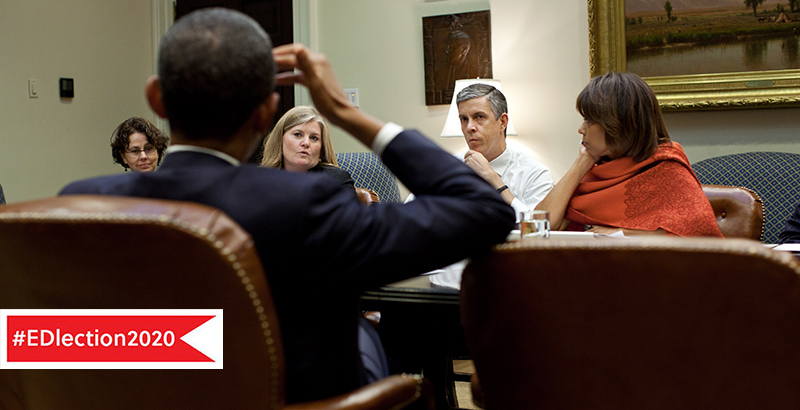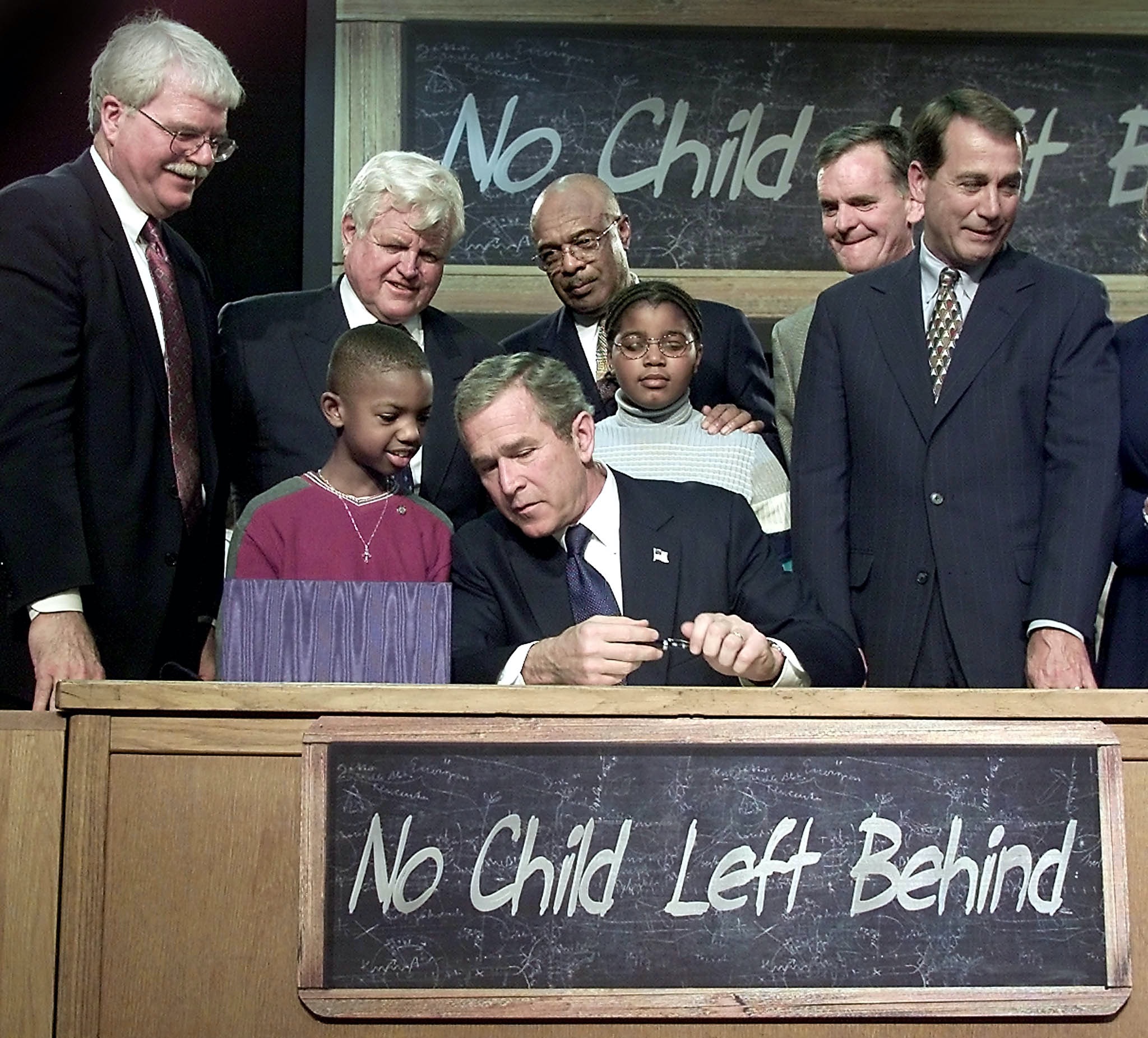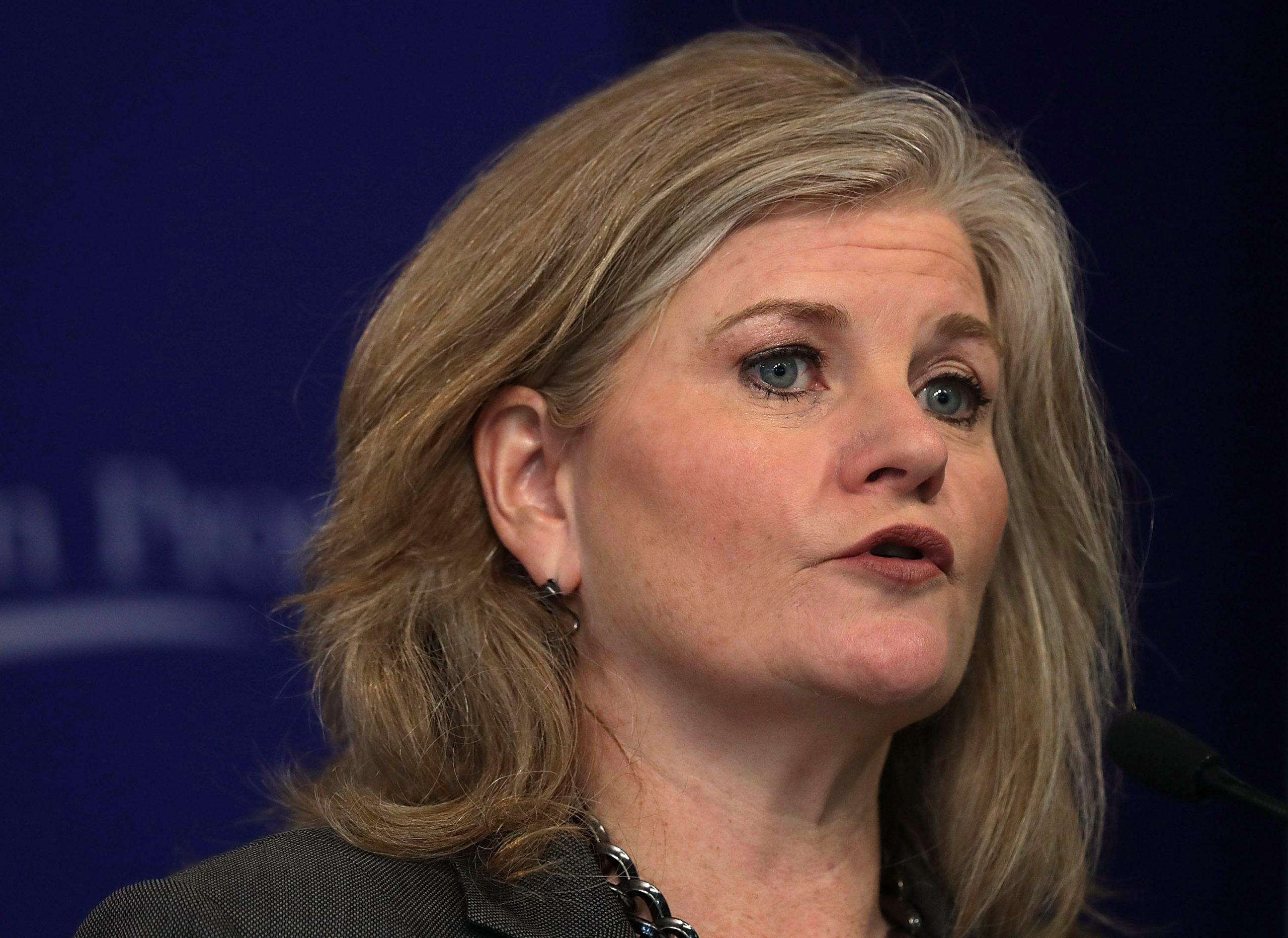Education Policy ‘Ghost’ Carmel Martin Is Biden’s Most Important Staffer You’ve Never Heard Of

Updated January 14, 2021: President-elect Joe Biden’s transition team announced that Carmel Martin will serve as deputy director for economic mobility on the White House’s Domestic Policy Council.
Carmel Martin is one of the most powerful education experts in Washington, a top Democratic policy adviser likely headed for a high-level job in the White House if Joe Biden is elected president. So why haven’t you heard of her?
“Carmel’s a ghost,” said Andrew Rotherham, a longtime education commentator and founder of the nonprofit Bellwether Education Partners. “You’re not going to find lots of published stuff by her. She’s that archetype that you can work with on various issues, an inside-game person, but she’s set herself up for this moment because she doesn’t have this crazy-long paper trail.”
Across a quarter-century spent in courtrooms, committee chambers and C-SPAN colloquies, Martin has labored to advance a liberal brand of education reform — by inches or yards, depending on who was willing to strike a bargain. As a Senate staffer advising Ted Kennedy, she helped shape and implement the No Child Left Behind Act, the most significant federal intervention in K-12 schools ever undertaken. At the left-leaning Center for American Progress (CAP), where Martin was hired as executive vice president for policy in 2013, she stepped up to defend the embattled Common Core standards from a red-state backlash. In between, she pulled a stint as assistant secretary of education under President Barack Obama, whose Race to the Top initiative led to a rash of new state-led policies on school choice and teacher evaluation.
Martin is now a senior adviser to Joe Biden’s campaign, the latest posting in a busy election cycle that also saw her serve Beto O’Rourke’s short-lived campaign as national policy director. If Biden wins in November, she is generally thought to be a staffer-in-waiting. But while her White House portfolio would likely span the entire Democratic agenda on social policy, simmering fights around school reform would also follow her into the West Wing.
The party’s education legacy over the past quarter-century was marked by ambitious changes to how schools operate and how states help them improve. Those changes are undergoing a phase of reconsideration on the left even as Martin, one of their most effective proponents, approaches what could be the zenith of her influence within the federal government. As evidence of her rising star, Martin was one of two staffers charged with leading the Democrats’ “unity task forces,” designed to locate common ground between the party’s left-wing and center-left camps after a divisive primary. The education panel’s recommendations drew criticism from committed reformers, who argued that they could lead to major academic reversals for poor and minority students.
Rick Hess, a resident scholar of education policy at the American Enterprise Institute, called Martin “responsible and thoughtful about ideas,” predicting that in a potential Biden administration, she would listen to dissenting voices across the political spectrum. As a conservative wonk, he said, he “couldn’t ask for much more than that” under Democratic leadership.
But he added that Martin might have to straddle a growing divide between two Democratic factions: an old guard of Hill veterans who helped build the prevailing consensus on standardized testing and school accountability, and an emergent group of critics typified by the party’s 2020 platform, which was built upon the Biden-Sanders task force recommendations and calls for new restraints on charter school growth and an end to high-stakes tests.
“Carmel was very enthusiastic about the Common Core; she was a strong supporter for No Child Left Behind,” Hess said. “And I think one of the interesting things in a Biden-Harris administration is how those tensions play out. Because where she was, where Ted Kennedy was, is very different from where a lot of the energy is on K-12 today.”
The consummate staffer
The view among Martin’s colleagues on the left is different. Neera Tanden, president of CAP and Martin’s former boss, said that Martin has evolved in her views with the rest of the Democratic Party, and that she was wedded less to education reform principles than to whatever policy worked best for students and teachers.
“Carmel is very much evidence-based,” Tanden said. “She’s not like, ‘I worked on something 20 years ago, so that’s got to be the law today.’ I feel like she knows these issues really well, and that’s really guided her.”
Martin did not reply to an interview request for this article. Over more than 20 years spent designing and implementing public policy, she has seldom received close press scrutiny, though her personal and professional background demonstrates an impressive trajectory of behind-the-scenes accomplishments.
Originally from New Jersey, Martin attended law school at the University of Texas, clerked for U.S. Appeals Court Judge Thomas M. Reavley, and spent several years working in private practice before moving to the Justice Department’s Civil Rights Division during the Clinton administration. In 1999, she began a decade-long tenure in the U.S. Senate when she was hired as chief counsel to New Mexico Sen. Jeff Bingaman.
It can be difficult to identify exactly where Martin sits philosophically, partly because of the years she spent as a staffer. In Congress, even top aides to very influential members — after advising Bingaman for several years on the Senate HELP (Health, Education, Labor and Pensions) Committee, she took a similar job on the staff of liberal powerhouse Ted Kennedy — must subordinate their own views to those of the politicians they serve.

Danica Petroshius, a lobbyist at the Penn Hill Group, served with Martin as a HELP staffer and later as Kennedy’s chief of staff. She said that her former officemate brought “deep knowledge of the evolution of policy” to the Biden team but that she would primarily function as an advocate for the vision of her president and party if the Democrats capture the White House this fall.
After years spent in the self-negating tribe, Petroshius said, it can feel as though “there is no ‘my opinion’; it’s the opinion of the people I work for. I don’t even speak on the record that often. It’s just not in my DNA because I’m a staffer, and I think she’s like that. It’s not necessarily about what Carmel thinks.”
In the heady early days of the school reform era, what mattered most on Capitol Hill was what education-focused lawmakers like Kennedy thought, along with Republicans like No Child Left Behind co-author Sen. Judd Gregg. The epic horse-trading that led up to the passage of NCLB, punctuated by late-night meetings over school funding and accountability mechanisms, was the product of a kind of bipartisan trust that has virtually gone extinct in the years since.
The warm feelings dissipated before long, with liberals like Kennedy saying that the Bush administration had failed to allocate sufficient funding to federal school improvement efforts. But according to Roberto Rodriguez, another Kennedy alumnus who served as an education adviser to the Obama White House, Martin was able to hold the Bush administration’s feet to the fire while still leaving room for cooperation with the other side.
“The ability to work across the aisle was just in Sen. Kennedy’s DNA, and was a deep expectation of me, Carmel and others,” noted Rodriguez, who now leads the teacher advocacy organization Teach Plus. “It’s very different from how the chamber works right now.”
David Cleary, a veteran of innumerable policy fights as chief of staff to Republican Sen. Lamar Alexander, said he had “spent a lot of time bickering about NCLB implementation” with Martin during her years in the Senate. When the law was reaching the end of its original five-year authorization, Kennedy’s office pushed for tweaks that would lower the rate of high school dropouts and improve coordination between families and schools.
As a liberal, Cleary said, Martin “figured she could technocrat her way into making things better.” But she also had a gift for finding agreements that both sides could live with — a quality that he argued would recommend her highly to Joe Biden, who rarely misses a chance to rhapsodize about Washington’s days of comity.
“They both seek consensus, and Carmel is very good at that,” he said. “It’s the old Kennedy model and, I guess, Biden model: You can’t cut a legislative deal and have the other guy walking away thinking they got screwed. In the minority, she was always very good at saying, ‘Here are the three things I have to have, and screw you if I don’t get them.’ And in the majority, she was good at saying, ‘I know you need three things, what are they?'”
Though she practices a stagehand’s gift for staying out of the limelight, Martin has occasionally strayed toward the center of attention in her years since leaving Congress. Once was during the second Obama term, when she made several public appearances to prop up the fortunes of the Common Core, which had transformed seemingly overnight from an obscure set of curricular standards to a culture-war prop.
The media blitz included a 50-minute radio debate on the issue broadcast by NPR, which pitted Martin and Thomas B. Fordham Institute president Michael Petrilli against Common Core critics of both the right and left: AEI’s Hess and Carol Burris of the anti-reform National Education Policy Center. After landing a few barbs at “the Glenn Becks of the world,” whom she held responsible for spreading misinformation about the standards, Martin helped mount a comprehensive defense that won over a live audience by a 67-27 margin.
Catherine Brown, who worked with Martin as CAP’s vice president of education initiatives, told The 74 that Martin was the kind of boss who was more likely to “get deeply into the weeds” of white paper proposals — CAP released a report around the same time that both warned against overtesting in schools and promoted the use of assessments aligned with the Common Core — than jump into a fray as a television surrogate. But she wouldn’t steer away from political confrontation if necessary.
“She’s not naive about the real challenges of any one act or person making dramatic change,” Brown said. “But she was still out there, on stage, debating Common Core at a time when the tide was very much against it, and I think her efforts probably helped it survive.”
Brown added that Martin’s extensive Rolodex and policy fluency were vital when CAP helped assemble TeachStrong, a motley coalition of unions, researchers and advocates that launched in 2015 to modernize the teaching profession. The campaign was seen as a policy blueprint for a possible Hillary Clinton presidency, and convening it required finding a balance between groups on both sides of protracted disputes around teacher training and tenure. Martin’s “greatest strength” lay in convening the disparate players, Brown remembered.
“She has really deep relationships with [American Federation of Teachers President] Randi Weingarten and pretty much everyone else in education policy — so instead of trying to solve it from behind a computer, she would pick up the phone, talk to people and figure out how to move forward.”
Tanden argued that the joint principles released by TeachStrong reflected a rare convergence among unions and reformers as well as the goodwill engendered by Martin as a negotiator.
“These were people who didn’t get into a room together very often, but [Martin] had credibility across the spectrum, and she was able to form a consensus view,” she said. “It’s not like they all decamped or something, but they were less like warring factions.”
Working on ‘good-guy litigation’
The election is still nearly two months away, and though Biden has enjoyed a remarkably stable lead over President Trump in the latest polls, plenty of surprises may be in store before most voters cast their ballots. That still hasn’t stopped Washington insiders from pondering about the makeup of a possible Biden administration, including the jobs that Martin might fill.
Hess, Martin’s former sparring partner, said that she had the policy chops and consensus-building skills to fill a top-level role in a potential Biden White House, possibly as the leader of the Domestic Policy Council. Other sources suggested a place as deputy secretary of education, or even deputy chief of staff in the West Wing.
While most of those positions would allow Martin to influence the administration’s agenda across a wide array of issues, Biden’s education agenda includes significant new goals that she would likely be in a position to oversee. The vice president has announced that he would implement a massive increase to Title I spending and provide families with a sizable tax credit for their child care expenses. The campaign also proposed cutting off federal funding to charter schools managed by for-profit entities, a position that President Trump inaccurately characterized as a bid to “close all charter schools.”

The question is whether the burgeoning debate around education reform’s past could trip up Martin and other high-level appointees. High-stakes testing and accountability policies, never beloved among teachers, are now being labeled as racist by some within the center-left coalition. During the presidential primary, candidates with ties to charter schools — including Beto O’Rourke, whom Martin staffed before moving to Biden’s team — had to step carefully.
Hess suggested that a Biden administration might sidestep the problem by focusing on issues outside the typical battle lines.
“The real action is probably going to be on higher ed, loan forgiveness, free college, early childhood [education],” he said. “And there, the ‘reform’ Democrats and the hard-left Democrats don’t really have as many major arguments. Even though it looks like Carmel was on one side of these fights about accountability and Common Core, in the bigger picture she winds up being someone who can alleviate some of the tensions.”
Although skepticism has grown on the left around policies advocated by Democrats like Obama and Kennedy, liberals like Tanden and Brown said that the party’s broader commitment to improving schools for minority and low-income students might allow the party’s next president to whistle past conflicts. Both argued that Martin’s own history as a civil rights attorney working in education law gave her additional credibility in the progressive policy sphere.
As a young lawyer for the prestigious Washington firm Hogan & Hartson, Martin spent part of the 1990s working on one of the most infamous civil rights cases in the country: United States vs. Yonkers, in which the federal government and the NAACP sued the New York city for segregating its schools and housing.
The suit, later dramatized in the nonfiction book and HBO miniseries Show Me a Hero, spent nearly three decades bouncing between federal courts as cash-strapped Yonkers appealed for more resources from the state to comply with its obligations to integrate. As a Hogan & Hartson associate, Martin helped craft briefs on behalf of the local board of education.
John P. Borkowski, an education lawyer who worked for the firm at the time, remembered making extended trips north of Manhattan to argue the case, describing the satisfaction felt by Martin and others at practicing what he dubbed “good-guy litigation.”
“We would often have dinner at a place up there, talking about the case and how we were really lucky to be drawing a big firm salary and promoting social justice at the same time. I don’t have a great memory, but that’s one very clear image I have: ordering steak and a Guinness and saying, ‘This isn’t bad. We’re working long hours, but we’re working for the public good.'”
Though decades have passed, Borkowski shared the impression he formed of his younger colleague.
“She was an impressive young lawyer — the kind that, in a big firm like that, you want to stay. But you realize she might not in a city like Washington.”
Disclosure: Andrew Rotherham serves on The 74’s board of directors.
Get stories like these delivered straight to your inbox. Sign up for The 74 Newsletter

;)
